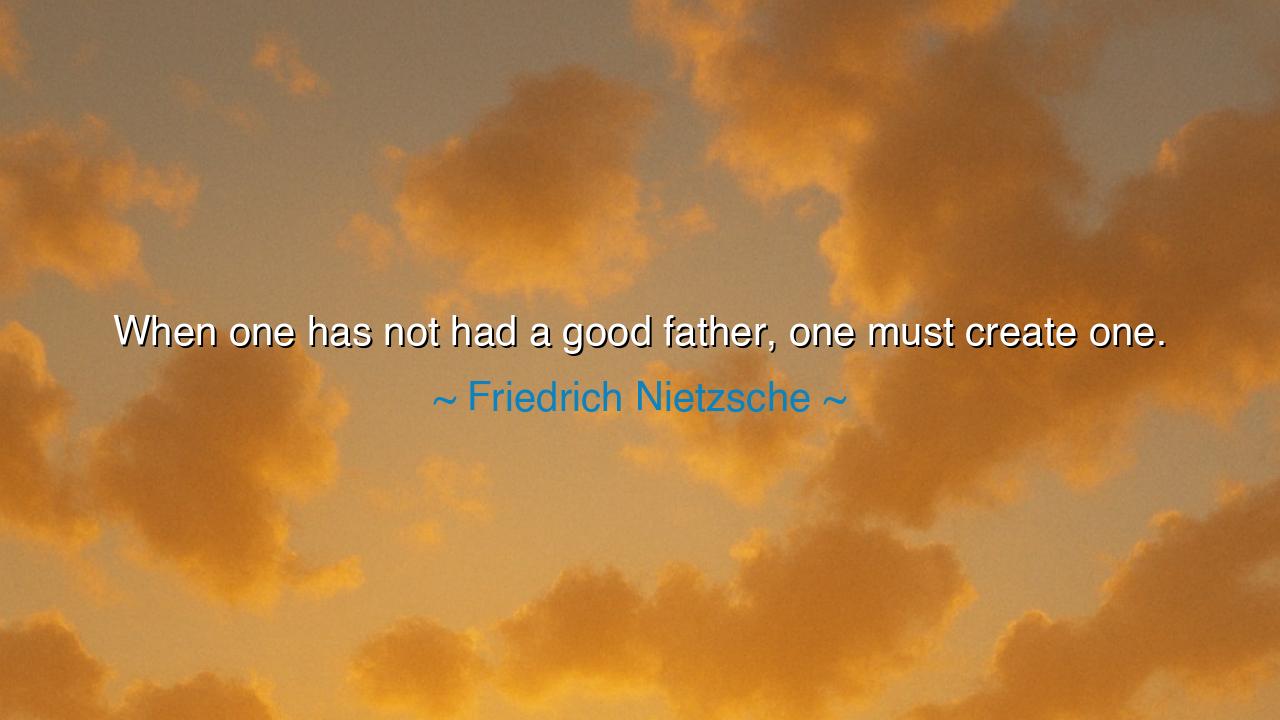
When one has not had a good father, one must create one.






“When one has not had a good father, one must create one.” Thus spoke Friedrich Nietzsche, the philosopher of will and self-overcoming, who sought to awaken in man the power to rise above his origins. In these words, simple yet fierce, he gives voice to one of the deepest truths of human existence — that we are not forever bound by the past, nor condemned to repeat the patterns of those who came before us. A man who has never known the shelter of a father’s wisdom, or the strength of a father’s love, is not doomed to wander in the shadow of that absence. He can, through courage and self-discipline, create within himself the father he never had — a guiding spirit born not of blood, but of will.
Nietzsche knew this pain himself. His own father, a Lutheran pastor, died when Friedrich was only five years old. The philosopher grew up surrounded by women — strong, loving, yet unable to give him the model of masculine strength and discipline he longed for. From that loss grew a lifelong struggle: the search for authority within, for the inner father who could instruct, challenge, and strengthen him. Thus his words are not a cold idea, but a confession forged in solitude. “When one has not had a good father, one must create one” — it is both a lament and a triumph, a call to become one’s own mentor, guardian, and guide.
To create a father is to take upon oneself the sacred work of self-formation. It means to craft, through reflection and will, the virtues that a father should have taught — courage, restraint, purpose, and moral clarity. It means to become the craftsman of one’s own soul. The ancients would have understood this well. In the teachings of the Stoics, the wise man is his own master, his own teacher. Marcus Aurelius, though an emperor surrounded by power, wrote each night in his journal as though speaking to a wiser father within himself. His “Meditations” were letters to his higher nature, reminders of patience, justice, and humility. In this way, he created the father that time or fate could not provide — the moral compass that would keep him true amidst empire and turmoil.
But Nietzsche’s insight reaches beyond the personal. He reminds all who suffer from broken lineage, from lost guidance or wounded legacy, that the past need not rule the future. Every man and woman can begin again. To inherit pain is not to become it. The one who had no father to love can still learn to love himself and others. The one who had no example of strength can still rise and embody it. This act — of forging from within what was denied from without — is among the noblest works of the human spirit. For it is the essence of creation: to bring forth light where there was only darkness.
In history, we see this pattern repeated. Abraham Lincoln, who lost his mother young and struggled with a harsh and distant father, became one of the most compassionate and disciplined leaders of all time. He built within himself the gentleness and wisdom he had not received. He did not curse his father’s failings; instead, he transformed them into a lesson. Through endurance, he created the father he wished he had, and in doing so, became a father to his nation. Such is the power of Nietzsche’s teaching — it is not a lament for what was missing, but an anthem for what can still be born.
And yet, to create a father within oneself is not only to gain strength; it is also to gain peace. The man who learns to forgive his past, who stops waiting for what never came, and instead builds it himself — that man is free. He no longer blames the wound but transforms it into wisdom. He becomes both the child and the teacher, the student and the master. His heart is no longer divided between longing and resentment; it beats with purpose, unified by the act of self-creation.
Therefore, my children, heed this wisdom: if life has denied you guidance, become your own guide. If you were never taught kindness, teach it to yourself through the way you treat others. If you were never shown courage, learn it by standing firm in your trials. The father you seek may not dwell in the flesh, but he can live in your spirit — in your discipline, your virtue, your compassion. In time, that inner father will speak with the calm authority of wisdom, saying, “You have made me real.”
For this is Nietzsche’s true gift to us — the reminder that we are not prisoners of inheritance, but creators of destiny. To create a father is to create character, to summon order out of chaos and direction out of despair. And when you have done this, you will stand as both the child of your past and the parent of your future — a whole being, self-made and at peace, carrying within you the strength of generations yet to come.






AAdministratorAdministrator
Welcome, honored guests. Please leave a comment, we will respond soon